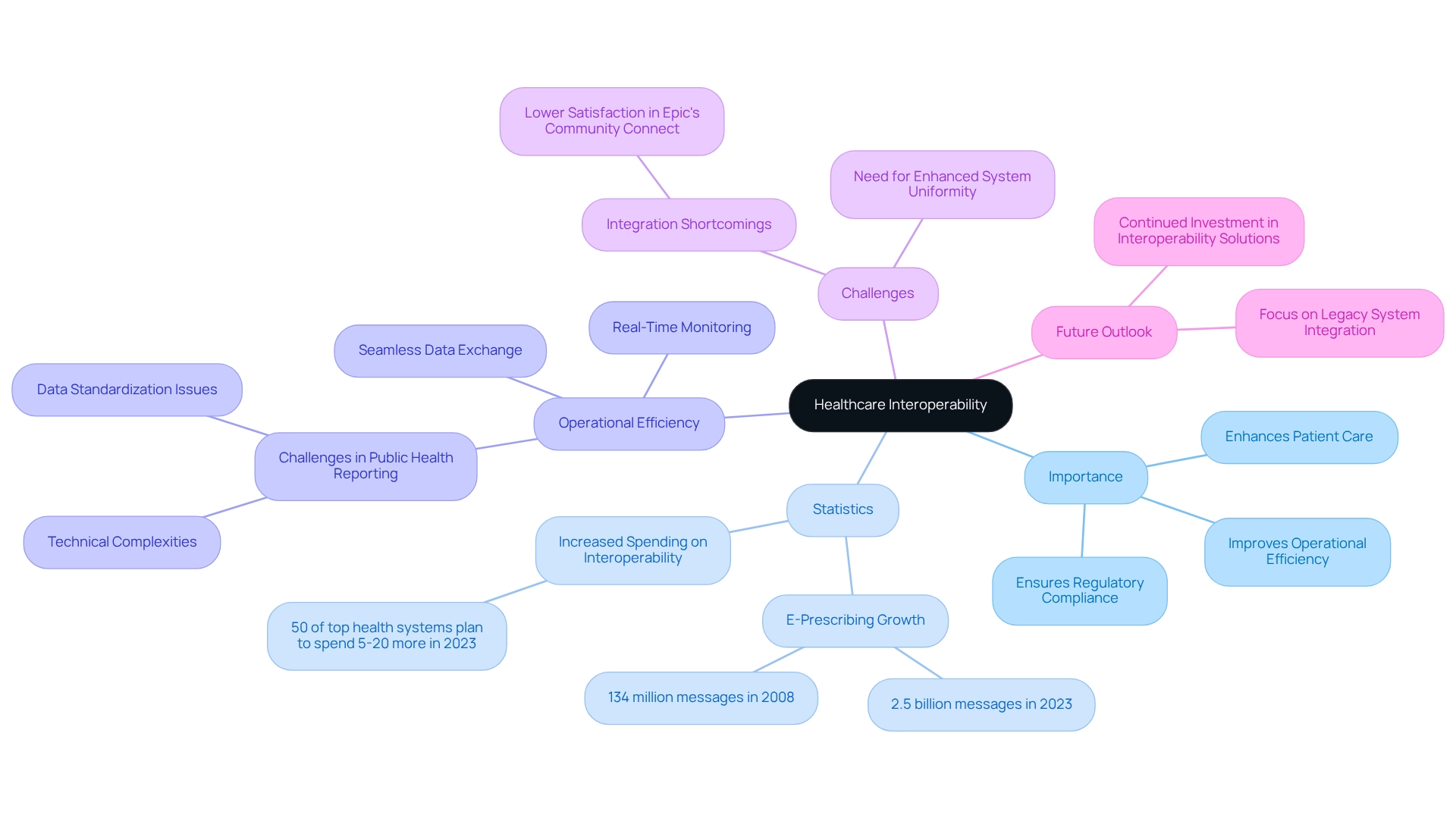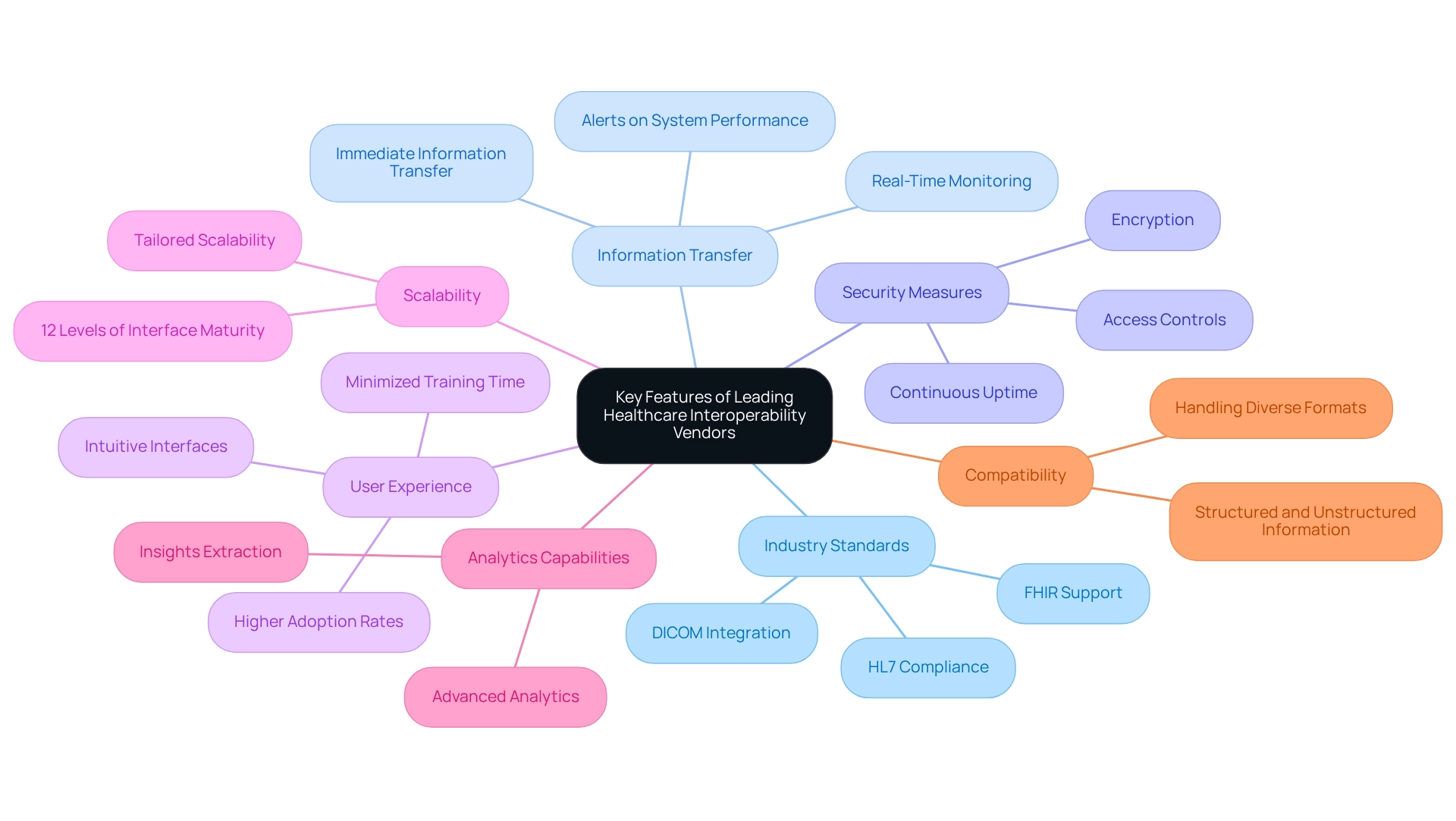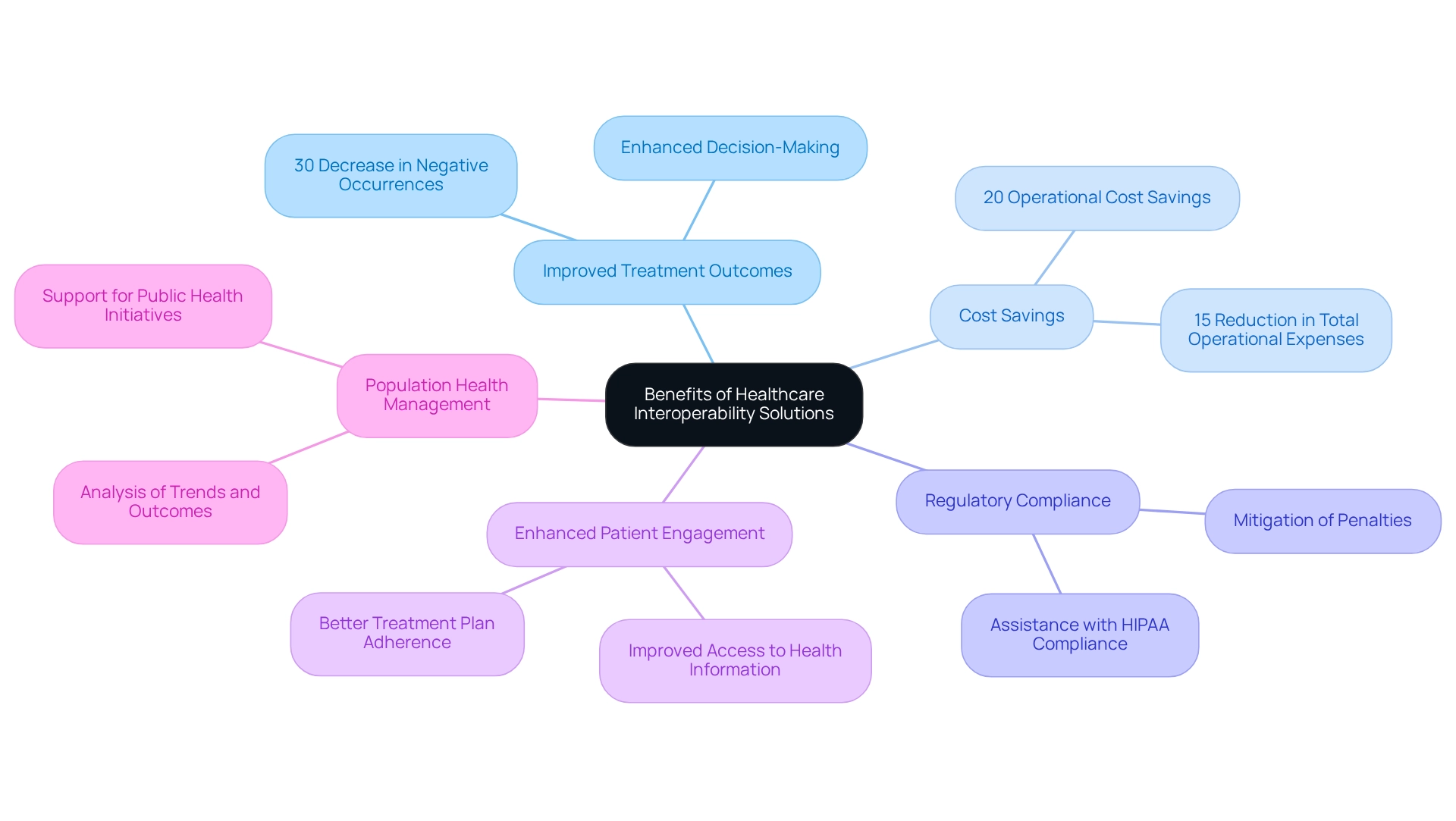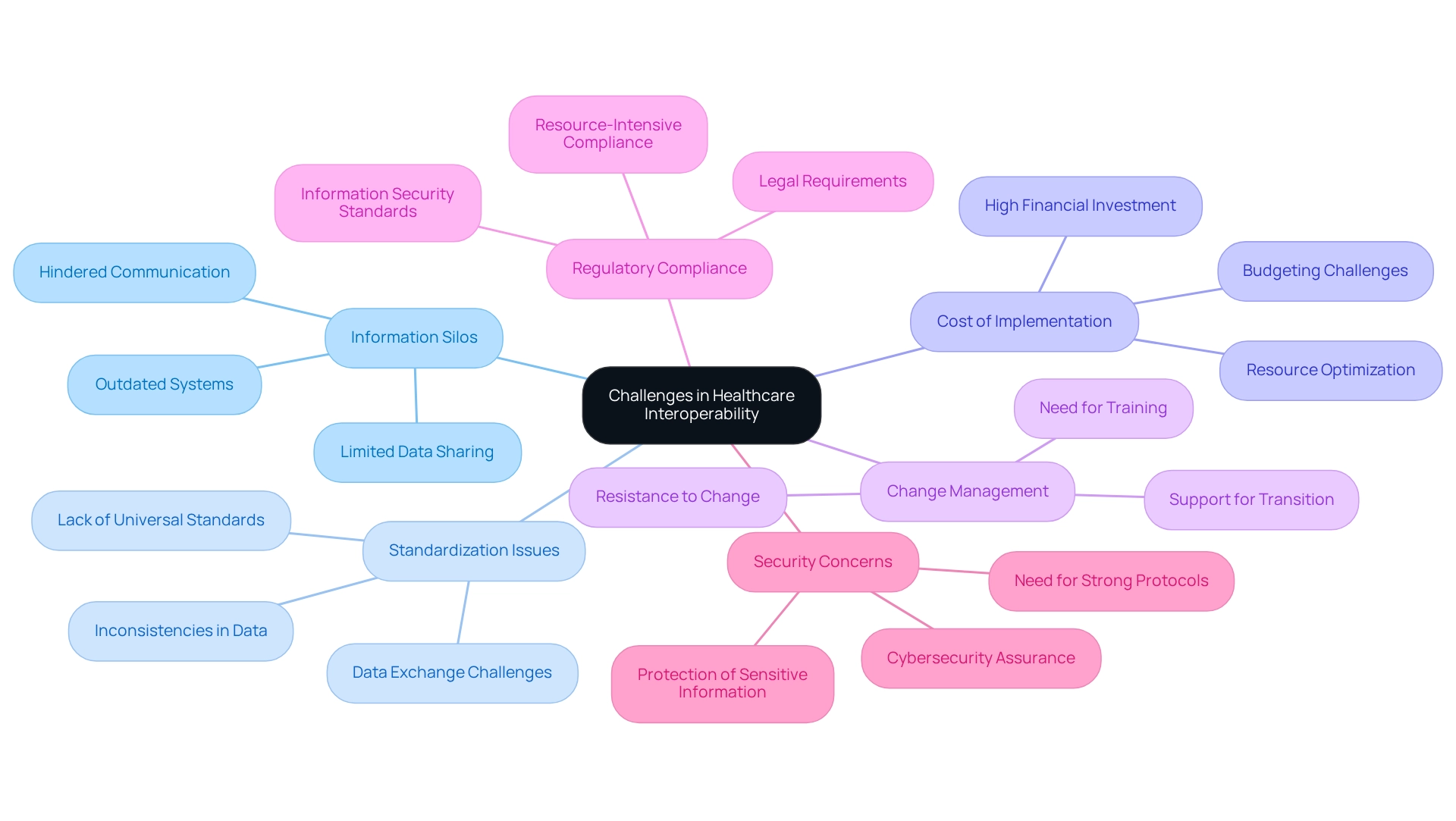Overview
We understand that effective data exchange and integration in healthcare settings is paramount. Our article delves into the critical comparison of healthcare interoperability vendors, showcasing their key features and benefits. Top vendors offer essential functionalities, including:
- Adherence to industry standards
- Real-time information transfer
- Robust security measures
- Advanced analytics
These capabilities collectively enhance patient care and operational efficiency. As a result, the significance of interoperability in modern healthcare cannot be overstated. What’s holding your team back from achieving seamless integration? We invite you to explore how these solutions can transform your healthcare operations.
Introduction
In the rapidly evolving landscape of healthcare, we recognize that interoperability is a vital component for enhancing patient care and operational efficiency. The ability of diverse health information systems to seamlessly access, exchange, and utilize data is crucial—not only for improving clinical outcomes but also for meeting regulatory standards. As healthcare organizations increasingly adopt digital tools and electronic health records, the demand for effective interoperability solutions has surged. Statistics reveal significant growth in e-prescribing and increased investments in interoperability by major health systems. What does this mean for patient safety and public health management? The implications are profound.
This article delves into the importance of healthcare interoperability, the key features of leading vendors, the myriad benefits it offers, and the challenges we face in implementing these essential solutions. By understanding the complexities and opportunities presented by interoperability, we can navigate the path toward a more integrated and efficient healthcare system. Together, let’s explore how we can enhance our healthcare delivery through strategic interoperability solutions.
Understanding Healthcare Interoperability: Importance and Impact
Healthcare interoperability vendors are essential for enabling various health information systems, devices, and applications to access, exchange, integrate, and utilize data collaboratively. This capability is vital for improving care for individuals, enhancing operational efficiency, and ensuring compliance with regulatory standards. Efficient collaboration enables us, as medical providers, to exchange individual information effortlessly, leading to enhanced clinical outcomes, fewer mistakes, and better individual experiences.
As medical systems increasingly embrace electronic health records (EHRs) and digital tools, the importance of collaboration becomes even more critical. In 2023, for instance, we saw Surescripts route 2.5 billion e-prescribing messages—a substantial increase from 134 million in 2008. This statistic underscores our growing dependence on compatible systems to enhance medication management and highlights the profound impact of compatibility on health service delivery.
The influence of compatibility extends beyond single patient care; it also bolsters public health efforts by enabling data sharing for research and population health administration. A recent survey of the top 50 health systems in the United States revealed that over half intended to increase their expenditures on system integration by five to 20 percent in 2023 compared to 2022, according to research expert Conor Stewart. This finding emphasizes the rising recognition of healthcare interoperability vendors’ significance in our evolving medical landscape. At Avato, we are committed to addressing these interoperability challenges. By maximizing and extending the value of legacy systems, we simplify complex integrations, empowering medical organizations to achieve seamless data exchange. Our hybrid integration platform not only enhances operational efficiency but also guarantees 24/7 uptime and reliability—critical factors in sectors like banking and healthcare. Furthermore, we provide real-time monitoring and alerts on system performance, further supporting organizations in managing their integrations effectively.
Real-world examples illustrate how interoperability can bolster operational efficiency. Ongoing challenges in electronic public health reporting have revealed that while capabilities have improved, providers still face obstacles related to standardization and technical complexities. Addressing these issues is imperative for achieving fully interoperable public health data systems, which can significantly enhance public health management. Moreover, it is essential to note that midsize to large outpatient facilities utilizing Epic’s Community Connect have reported decreased satisfaction levels, indicating potential shortcomings in current integration solutions that warrant our attention.
In conclusion, the significance of medical data exchange in 2025 cannot be overstated. It not only enhances patient care but also drives operational efficiencies, establishing itself as a cornerstone of contemporary medical delivery. By recognizing the challenges and opportunities presented by system compatibility, we can more effectively navigate the complexities of medical integration, leveraging solutions like Avato’s to secure our operations for the future.

Key Features of Leading Healthcare Interoperability Vendors
Top healthcare interoperability vendors offer a collection of crucial features that facilitate effortless information exchange and integration, vital for contemporary healthcare settings. We understand that adherence to industry standards such as HL7, FHIR, and DICOM is essential for ensuring compatibility across diverse systems, facilitating smoother information sharing. Our hybrid integration platform supports these standards, ensuring organizations can effectively integrate their systems and enhance business value.
The ability for immediate information transfer is essential for prompt decision-making, significantly improving outcomes for individuals and operational effectiveness. Our platform excels in offering this functionality, enabling medical providers to react promptly to shifting conditions. Furthermore, we provide real-time monitoring and alerts on system performance, enabling proactive management of integrations and ensuring optimal operation.
Robust security measures, including encryption and access controls, safeguard sensitive patient information during transmission, addressing growing concerns over data privacy. We guarantee continuous uptime and dependability, making our platform a secure option for intricate systems in banking, medical services, and government. Intuitive interfaces enhance usability for medical professionals, minimizing training time and fostering higher adoption rates among users. Our commitment to user experience enhances the overall effectiveness of our integration solutions.
As healthcare environments evolve, solutions must be scalable to manage the growing volume of information and the expanding number of connected devices, ensuring long-term viability. Our platform is designed to support 12 levels of interface maturity, allowing for tailored scalability that meets evolving organizational needs. We specifically design our hybrid integration platform to maximize and extend the value of legacy systems, simplifying complex integrations and reducing costs.
Advanced analytics capabilities empower organizations to extract valuable insights from integrated information, supporting informed clinical and operational decisions. This feature is crucial for maximizing the value of legacy systems and driving business outcomes. Additionally, the capability to handle diverse formats, including both structured and unstructured information, is crucial for attaining comprehensive compatibility across systems.
As the healthcare data compatibility market is projected to reach $19.28 billion by 2028, with an 18.3% CAGR, the focus on healthcare interoperability vendors will only increase. Moreover, the 2023 AHA IT Supplement survey showed that more than half of the top 50 health systems in the U.S. intend to boost their spending on healthcare interoperability vendors by 5 to 20% compared to the prior year, emphasizing the industry’s dedication to improving integration capabilities. Gustavo Estrada, a customer, noted that “Avato has the ability to simplify complex projects and deliver results within desired time frames and budget constraints,” underscoring the platform’s effectiveness. Moreover, efforts such as the Behavioral Health Information Technology Initiative showcase the practical uses of integrated solutions in tackling gaps in health information exchange.

Benefits of Healthcare Interoperability Solutions
Implementing healthcare interoperability vendors yields a multitude of advantages. We understand that smooth access to individual information enables healthcare professionals to make knowledgeable choices, greatly improving treatment results. Statistics suggest that system compatibility can result in a 30% decrease in negative occurrences for individuals, highlighting its essential role in safety for those receiving care. However, we acknowledge that 24% of hospitals face limitations in data exchange due to contractual constraints, which can hinder the full realization of interoperability benefits.
Moreover, streamlined workflows reduce administrative burdens, allowing medical professionals to allocate more time to patient care instead of paperwork. This efficiency can lead to operational cost savings of up to 20%, as reported by various medical organizations. Our hybrid integration platform accelerates this process by simplifying the integration of disparate systems, allowing healthcare interoperability vendors to enable healthcare providers to focus on delivering quality care.
Cost savings are another critical advantage. Interoperability reduces expenses associated with duplicate tests and procedures, as well as the time spent on data entry and management. A study discovered that hospitals adopting integration solutions saw a 15% reduction in total operational expenses. Our solutions further boost these savings by offering a strong foundation for secure transactions, especially in sectors such as banking and medicine where reliability is crucial.
Regulatory compliance is paramount in our industry. Many healthcare interoperability vendors offer solutions tailored to assist organizations in adhering to healthcare regulations, such as HIPAA and the 21st Century Cures Act, thereby mitigating the risk of penalties and enhancing compliance efforts. Our platform is architected for secure transactions, making it a trusted choice for organizations needing to meet stringent compliance standards.
Additionally, integrated information facilitates enhanced population health management. We enable the analysis of trends and outcomes across populations, supporting public health initiatives and enabling proactive care strategies. This capability is essential for addressing health disparities and improving community health outcomes. We empower organizations to leverage their data effectively, enhancing their ability to manage population health.
Furthermore, interoperability improves access to health information, fostering greater engagement and participation in personal care. Involved individuals are more likely to follow treatment plans, resulting in better health outcomes and satisfaction. Our solutions support this engagement by ensuring that patient data is easily accessible and securely integrated across systems.
In 2022, a considerable segment of health service leaders acknowledged the need to join Qualified Health Information Networks (QHINs) to improve interconnectedness, highlighting the role of healthcare interoperability vendors in enhancing the significance of this approach in contemporary medical service provision. As Conor Stewart, a research specialist focused on health & pharmaceuticals in the UK & Europe, pointed out, a third of EHR executives were actively considering options to join QHINs, underscoring the recognition of system compatibility by healthcare interoperability vendors.
The case study of InterSystems IRIS for Health™ demonstrates how a strong platform for medical data management, provided by healthcare interoperability vendors, meets high demands for data integration and compatibility, allowing medical applications to seamlessly share data and ultimately enhancing patient care. We stand out in this landscape by providing a dedicated hybrid integration platform that simplifies complex integrations and enhances business value.
“Good team. Good people to work with. Extremely professional. Extremely knowledgeable.” – Tony LeBlanc, Provincial Health Services Authority. This feedback underscores our commitment to delivering effective integration solutions. Our beginnings are founded on a commitment to streamlining intricate integrations, enabling medical organizations to tackle the difficulties of system compatibility with assurance.

Challenges in Implementing Healthcare Interoperability Solutions
Implementing healthcare interoperability vendors’ solutions presents significant challenges that we must navigate.
- Information Silos remain a pressing issue, as many healthcare organizations still rely on outdated systems lacking efficient communication features. This results in information silos that hinder interoperability, severely limiting the ability to share essential health information across platforms. As Barchi pointed out, “We’re not there until doctors can examine a patient and understand they can retrieve that patient’s information, everything necessary to know about their patient without signing into various systems.” Our hybrid integration platform is designed to unlock these isolated assets, enabling seamless information sharing and enhancing overall business value.
- Standardization Issues further complicate our efforts. The absence of universally accepted standards makes data exchange between diverse systems and healthcare interoperability vendors challenging. Statistics indicate that a significant percentage of healthcare organizations face difficulties due to inconsistencies associated with healthcare interoperability vendors, leading to inefficiencies and errors that ultimately impact patient care. We address these concerns by offering a robust framework that facilitates standardization and compatibility across different platforms.
- Cost of Implementation is another barrier we encounter. The financial investment required for interoperability solutions can be considerable, often posing a challenge for smaller organizations. This necessitates careful budgeting and planning to ensure successful implementation. Our partnerships with healthcare interoperability vendors and managed service providers globally can help organizations optimize resources and reduce costs associated with data transformation projects.
- Change Management is crucial for successful adoption. Resistance to change among staff can significantly hinder the implementation of new systems and processes. Comprehensive training and ongoing support are essential to facilitate a smooth transition and encourage user buy-in. We emphasize the importance of staff training and change management strategies to foster a culture of innovation within organizations, ensuring that teams are well-equipped to utilize the new platform effectively.
- Regulatory Compliance presents a complex landscape. Organizations must ensure that their interoperability solutions provided by healthcare interoperability vendors comply with all legal requirements, which can be resource-intensive. Our solutions are crafted with adherence in mind, assisting organizations in navigating regulatory challenges while upholding high standards of information security.
- Security Concerns cannot be overlooked. Protecting sensitive client information during transfer and storage is essential. In 2022, a significant proportion of medical organizations conveyed worries regarding their cybersecurity assurance, emphasizing the necessity for strong security protocols to reduce risks and safeguard against possible breaches, particularly as cybersecurity apprehensions persist in the medical field. Our hybrid integration platform includes advanced security protocols to guarantee that individual information remains safeguarded throughout its lifecycle.
Tackling these challenges is essential for medical organizations seeking to enhance system compatibility and improve care outcomes by collaborating with healthcare interoperability vendors. As emphasized by industry leaders, attaining genuine interoperability involves ensuring that healthcare providers can access extensive individual information effortlessly, without the necessity to maneuver through various systems. Furthermore, initiatives like those highlighted by HealthTap’s CEO, which focus on creating end-to-end experiences centered around the patient, illustrate the industry’s push towards collaborative solutions that empower patients and enhance data sharing.

Conclusion
The significance of healthcare interoperability is paramount in today’s healthcare landscape. We recognize it as a pivotal element in enhancing patient care, ensuring operational efficiency, and facilitating compliance with regulatory standards. As healthcare organizations increasingly rely on electronic health records and digital tools, the seamless exchange of data is essential for improving clinical outcomes and reducing errors. The statistics surrounding e-prescribing and growing investments in interoperability solutions highlight a clear trend toward a more integrated healthcare system.
Despite the myriad benefits that interoperability offers—such as improved patient engagement, cost savings, and enhanced population health management—several challenges remain. Data silos, standardization issues, and the costs associated with implementation can hinder effective integration. However, organizations like Avato are leading the way in addressing these challenges by providing innovative solutions that maximize the value of legacy systems and simplify complex integrations.
Ultimately, the path to achieving robust healthcare interoperability lies in recognizing both the challenges and opportunities it presents. By prioritizing interoperability, we can not only enhance patient safety and care but also drive significant improvements in operational efficiency. As the industry continues to evolve, embracing interoperability will be crucial to future-proofing healthcare operations and ensuring that patients receive the highest quality of care.

